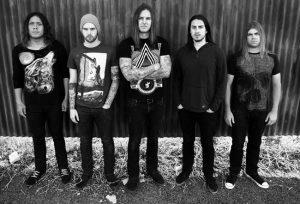Interview: As I Lay Dying

You’re grinding through a grueling tour and your long-anticipated day off finally arrives. How would you like to spend your time? How about hammering out answers for interview questions?
“I guess I’m going to have to cancel all my fun plans for our off day in Ljublana [Slovenia] and hang out in a hotel room for the next few hours. Either that or get scolded by our management or label. Just kidding, kinda.”
Such is the plight for As I Lay Dying guitarist Nick Hipa, who graciously shoulders the burden and provides a short novel’s worth of material responding to our e-mail queries. Currently in the midst of a world-wide tour, aptly promoted as “A Decade Of Destruction,” As I Lay Dying is circling the globe to celebrate its 10-year anniversary. It’s a natural point to take a retrospective glance at the band’s history, refresh current activity, and set the stage for what lies ahead. As Hipa relates the band development, his narrative takes shape as an archeological excavation that reveals the evolution of earnest, wild-eyed kids into professional artists poised at the very top echelon of metal/hardcore artists.
“When Tim [Lambesis, vocals] and Jordan [Mancino, drums] first started the band back in 2001, they were pretty much the only ones absolutely dedicated to ‘the cause.’ At that point, however, there was never a clear direction as to what the band’s sound was. More than anything, it was a culmination of tastes influenced by the revolving cast of contributing musicians.”
Fast forward a couple of years . . .
“In late 2003 and early 2004 Phil [Sgrosso, guitar] and I joined the band. It was at this point that Tim and Jordan finally found dudes who were equally as passionate about pursuing music and also willing to stick it out, for better or worse. The first release we were part of was Shadows Are Security [(Metal Blade)]. Phil was 18 and I was 21 when we recorded it. As musicians, we were all still really young and had tons of room to improve, but that release is us doing the best with what we had.”
Unquestionably, the raw energy and razor-edged intensity are there, but in wild, frayed form; you can hear the limitations in the songwriting on Shadows, especially compared to where the band is today. There’s hardened precision and powerful depth on subsequent albums that are a result of the guys becoming more technically proficient while developing a methodical, deliberate songwriting process, and simply meshing together over time. Hipa explains how the creative process improved with each album.
“I guess it depends on who you ask, but we all felt like [2007’s] An Ocean Between Us was a big step up from Shadows . . . [W]e were able to be more meticulous with our parts and the album become even more of what we had intended . . . Before, we would do the ol’ ‘show up to practice and see if anyone had a cool idea’ routine. By the time we started writing for [last year’s] The Powerless Rise, we were sending full song ideas to each other before actually jamming. We had more material than ever before recording, and the caliber of that material was better than it had ever been. The older we get and the longer we do this, the more we understand exactly what we like and what we don’t.”
Hipa further elaborates the democratic and egalitarian nature of the songwriting process, which still retains a degree of fluidity despite the routine that they’ve developed.
“Typically, someone sends out an e-mail with an MP3 of a complete song, or at least rough arrangement of several riffs. Whichever of those songs gets the majority of the other members stoked is the one we end up rehearsing together. From there, everyone adds their own touch based upon what they feel it needs. It is this process that dictates how our songs come out. Since we’re all usually listening to and drawing influence from different things, we’re never certain of what to expect from our collective collaboration with one another. This has been a huge factor in the development of our sound, and we prefer it to occur organically and naturally this way.”
As he describes it, Hipa’s growth as a player follows a similar trajectory, and he conveys a comfortable self-awareness and keen sense of purpose, which drives his approach.
“Have you ever known someone who does something so naturally and excellently that it appears effortless? I see all of my favorite musicians this way. Unfortunately, I was not dealt the talent-developing luck. What I did get was the ability to love it enough to never give up at it. Whether I’m trying to write something or just trying to get better technically, I run into the same walls of frustration that any guitar player does. The trick is to keep on ‘keepin’ on’ and being tenacious.”
The culmination of that tenacity could be AILD’s Grammy nomination, and Hipa confirms how significant that was for the band. It wasn’t a signal of selling out or succumbing to mainstream pressures, but rather it was validation of their dedication and professionalism.
“Being nominated for a Grammy in 2007 is something I’ll never forget. Not necessarily because it meant we had ‘made it’ or anything, but because it was an achievement that my family could actually look to as tangible evidence that I was doing something worthwhile. Dropping out of college to play in a band wasn’t actually met with tons of fanfare, but when we started ending up high on the Billboard charts and getting award nominations, my extended family started to take what I did a little more seriously.”
— Patrick Conlan
For the full feature, click the December issue’s cover image, or grab a copy of Illinois Entertainer — free throughout Chicagoland.










Interesting to read about the creative process. I’ve never heard AILD, but now I want to.